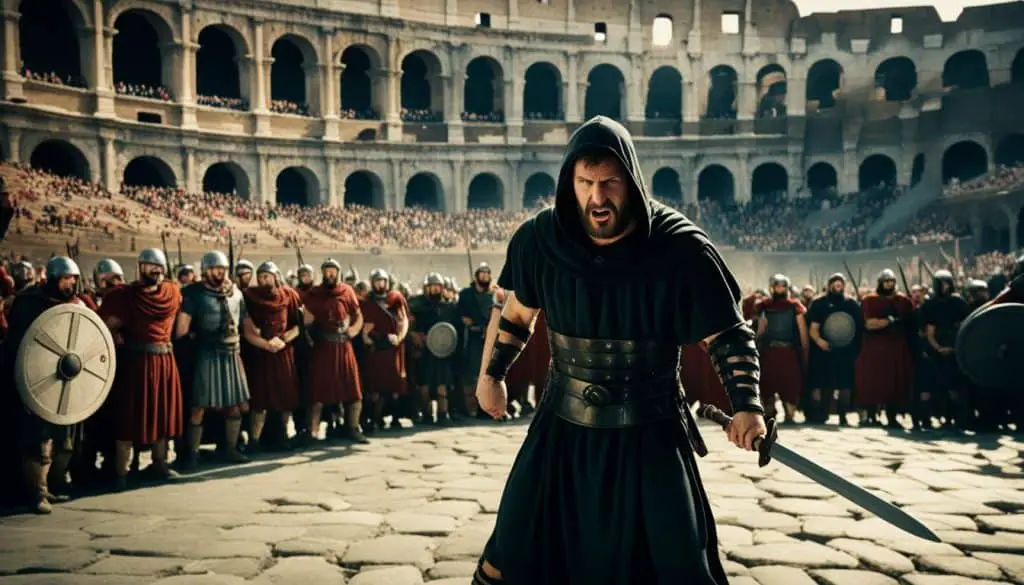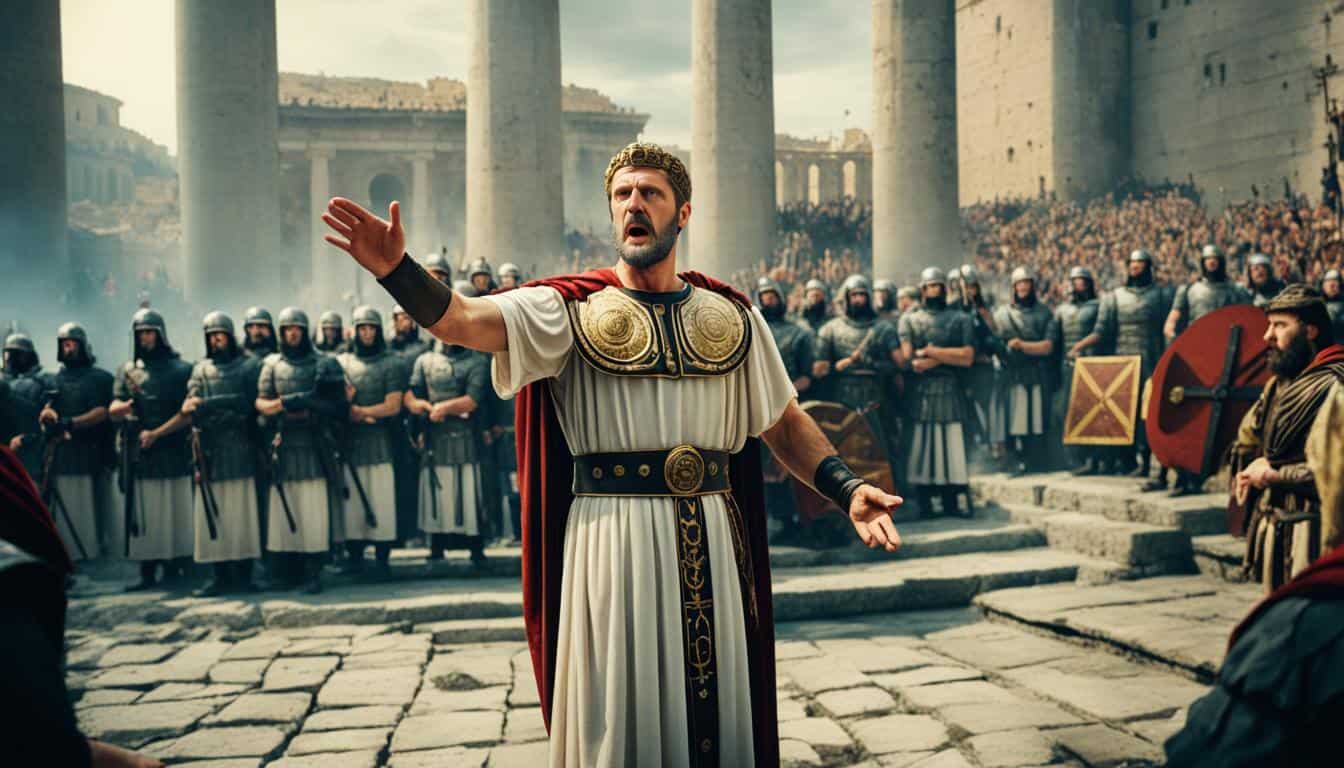Table of Contents
Ever thought about how Roman rules changed the growth of early Christianity? Let’s look at the influence of Roman emperors. Also, their acceptance of local beliefs and how laws impacted this young faith.
One key rule was the Pax Romana – the Roman Peace. This made movement and communication easier for everyone, including Christians. However, Christians also met many challenges in their daily lives due to this.
Let’s explore the story of Roman laws and early Christianity. We’ll see how emperors’ decisions, local beliefs, and Christian faith interacted. Also, how aspects like taxation, censuses, and laws affected the lives of these early believers every day.
Pax Romana: Ensuring Peace and Stability
The Roman empire brought an era of peace and order called Pax Romana under leaders like Augustus Caesar. This policy aimed to maintain peace and stability over a vast area. It allowed early Christianity to grow without much trouble.
This time ensured that areas under Roman rule were calm and secure. It was perfect for people to learn and accept the Christian faith.
“The Roman peace gave us the freedom to travel and share the teachings of Christ without constant fear of persecution. It allowed us to establish communities of believers and nurture the faith, creating an environment where Christianity could flourish.” – Apostle Paul
Rome’s strong road network helped spread Christianity. It allowed missionaries to teach about Jesus easily, in cities as well as the far countryside.
The Roman peace made it easier for Christians to meet and worship. Without big wars, they could gather freely. This helped Christ’s message to grow among believers.
Rome was mostly tolerant of different religions during Pax Romana. Even though they had many gods, they let people practice their beliefs peacefully.
The Role of Augustus Caesar
Augustus Caesar led Rome into a time of peace and growth. His rule encouraged the spread of Christianity. He focused on uniting the empire and making it strong.
He worked to stop fighting and set up a well-structured government. This made life better for everyone, including early Christians.
The time under Augustus Caesar was calm and manageable. It gave Christians a chance to practice their faith without fear. This helped Christianity to slowly win over more followers.
| Key Features of Pax Romana | Impact on the Spread of Christianity |
|---|---|
| Emphasis on law and order | Created a secure environment for the spread of Christianity |
| Tolerance of diverse religions | Enabled Christians to practice their faith with minimal interference |
| Efficient communication networks | Facilitated the dissemination of Christian teachings |
| Stability and social cohesion | Promoted the establishment of Christian communities and the growth of the faith |
Pax Romana was critical for Christianity in its early days. It was a time of peace and order under leaders like Augustus Caesar. This allowed Christianity to grow steadily but without much trouble. Pax Romana was all about keeping the peace, promoting religious freedom, and making sure everyone could share their beliefs. It was a key time for Christianity to become a major part of Roman life.
Tolerance of Local Cults and Friction with Christianity
When Christianity first began, Roman rulers were often accepting of other local faiths. They wanted all religions that didn’t disrupt peace. Back then, this peace was key to keeping the large Roman Empire stable. But, the rise of Christianity started to change things.
Christians stood out because they refused to worship the Roman emperors or take part in the old rites. This made the Romans nervous. They thought it might shake the core of their society and religion.
“We cannot worship false idols or acknowledge the divine status of any mortal being. Our allegiance lies solely with our God,” affirmed Saint Paul, one of the prominent early Christian leaders.
Because Christians only believed in one God, and didn’t do as the Romans did, they were in trouble. This was because the Roman Empire closely linked religion and politics. They worried this new belief system could harm the Empire’s unity.
So, the Romans began to persecute Christians. They saw them as a threat to the order and loyalty of the people, who all shared the common worship of the Roman gods.
Many Christians were punished, even unto death, to control the situation. The aim was to stop the Christian faith from spreading.

This dark time tested the early Christians’ dedication. They had to be smart about practicing their faith, often meeting in secret spaces.
| Effects of Christian Persecution | Notes |
|---|---|
| Increase in Christian Martyrdom | The persecution of Christians led to the rise of martyrs who became symbols of faith and resilience. |
| Underground Christian Communities | Christian communities were driven to practice their faith in secret, resulting in the formation of underground churches. |
| Growth of Christianity | Paradoxically, the persecution of Christians also fueled the growth and spread of Christianity as martyrdom and acts of defiance inspired others to join the faith. |
The persecution shows how powerful intolerance can be in shaping religion and society. Despite the hardships, the Christians’ faith endured, changing history forever.
Census and Taxation: Impact on Daily Lives
In early Christianity, censuses and taxes in Rome affected Christians greatly. This shaped their everyday experiences. Now, let’s look at how these activities influenced the early Christian community.
Roman authorities took censuses to count the people and tax them accordingly. People had to list their names, family, and assets. Although this was for fair tax distribution, it made some Christians wonder about going along with it.
Legitimacy and Questions
Like Jesus, who doubted paying taxes, some Christians felt unsure. They questioned whether it was right to fund an oppressive government. This sparked moral debates within the early Christian groups.
“Render to Caesar the things that are Caesar’s, and to God the things that are God’s.” – Matthew 22:21
Early Christians were torn between obeying Roman laws and their faith in God. This made them discuss how to stay faithful under Roman rule.
Compliance with the Roman System
Even with concerns, many Christians paid taxes to Rome. They wanted to keep peace and order in society. Tax payments ensured they could live, worship, and protect their faith in peace.
Paying taxes also gave Christians a legal standing. They showed they followed local laws. This way, they received some protection under Roman rule.
The Dual Role of Censuses and Taxation
Therefore, censuses and taxes had a mixed effect on early Christians. While it challenged their beliefs, it also secured their position in society. This balance was crucial for their survival and development.
These issues shed light on the struggles Christians faced. Balancing loyalty to their faith with Roman compliance shaped their lives. This period set the stage for Christianity’s growth and its lasting influence.
“Give to everyone what you owe them: If you owe taxes, pay taxes; if revenue, then revenue; if respect, then respect; if honor, then honor.” – Romans 13:7
Legal System and Capital Punishment
Roman law shaped the vast Roman Empire’s governance. It allowed for settling disputes and keeping order. However, early Christians faced a big challenge because of it.
They were often accused of serious crimes like blasphemy and treason. If found guilty, they could face harsh punishments, even death.
“We must obey God rather than men.” – Acts 5:29
The apostles highlighted the conflict between Roman law and Christian teachings in these words.
Accusations such as blasphemy and treason were common. These charges came because Christians didn’t worship Roman gods or see the emperor as a god. This was seen as going against Roman authority.
Legal matters often had a religious aspect under Roman law. For Christians, this meant their faith was questioned in courts.
The table shows the crimes and possible punishments under Roman law:
| Charge | Punishment |
|---|---|
| Blasphemy | Death by crucifixion or beheading |
| Treason | Death by crucifixion or being thrown to wild animals |
The Severity of Capital Punishment
These punishments were very severe. The Roman authorities used them to show their power and discourage any opposition.
Yet, the early Christian group continued to grow. Their strong faith helped them through persecution and legal troubles.

Freedom of Assembly and Association
The Romans controlled public gatherings, affecting early Christians. They couldn’t hold meetings or do missionary work freely. Roman rulers stopped Christian activities in some places, making it hard for the group to come together.
Restrictions on Christian Meetings
Under Roman rule, approval was needed for public meetings. Early Christians met obstacles when organizing. Roman leaders were cautious of trouble within the gatherings, so they kept a close eye and set rules to stay in charge.
“Our worship and fellowship meetings were key for our community’s development. Yet, they were watched by Roman authorities. We were careful and aware of the meeting limits set on us.”
The limits on Christian meetings blocked them from openly sharing their faith. They had to be secretive and creative in how they practiced their beliefs.
Challenges to Missionary Work
Limitations on gatherings made spreading Christianity harder. Without the chance to meet in public or talk openly about their faith, the message was muffled. Roman control restricted the missionaries’ work and made it tough to reach more people.

The image above shows the early Christians gathering.
The Courage of the Christian Community
Despite Roman restrictions, early Christians showed they were smart and determined. They found new ways to meet, including gathering secretly in homes or in small, hidden spots.
“Roman rule made our job harder but also united us. Our secret meetings became a source of comfort and strength, knowing we were all in this together.”
By finding ways around the constraints, early Christians built not just a community, but a church that would survive the tough times.
| Impact of Roman Control on Christians | Solution |
|---|---|
| Restrictions on large Christian meetings | Conducting smaller gatherings in discreet locations |
| Challenges to missionary work | Adapting strategies to reach individuals on a smaller scale |
| Increased resilience and unity within the Christian community | Strengthening the bond through clandestine gatherings |
Conclusion
The Roman policies we talked about really influenced how Christianity grew early on. The peace of Pax Romana and the struggles Christians faced were both key. They helped shape how Christianity spread in ancient Rome.
During Pax Romana, when there was relative peace, it was easier for Christianity to spread. Christians had the chance to share their beliefs without many interruptions.
But Christians also met problems due to Roman laws. They didn’t worship the emperor or follow common religious customs, which often got them in trouble. This could lead to them being not treated fairly or even hurt.
Yet, Christianity kept growing despite these challenges. The Roman laws were a big part of the story. Knowing about these laws helps us see how Christianity not only survived but thrived in the Roman Empire.




